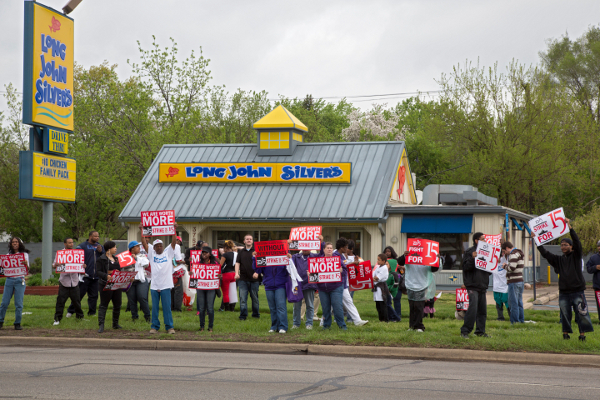
In recent months we have seen unprecedented demonstrations by fast food workers, retail workers, and other low-wage workers. These struggles are spread out across the country, yet they are unified in their message: Pay us a living wage of $15.
More than simply fighting for a wage increase, this movement represents a section of the working class that has been robbed of a future in this economy and is at the forefront of fighting for a new society. They are fighting for the right to survive and thrive when all other options have been taken away.
Modern technology is so profitable and efficient that corporations are making record profits while minimizing the number of workers needed. Living wage industrial jobs have been eliminated, and white-collar jobs are disappearing just as fast. America’s workforce is pushed into low wage jobs or permanent unemployment. What were once considered “starter jobs” are now the primary form of employment for millions of Americans regardless of age, race, or educational attainment.
Low wage workers see the massive wealth that passes through their hands on the way to the owners, compared to their own paychecks, and they are fed up. A Chicago Macy’s employee explained, “in that eight hours that I’m making [Macy’s] $1000, I only made myself about $60… if me, one person, is bringing in $1000, I’m pretty sure all [my co-workers] are bringing in $1000. So it’s like this money is coming in, it’s going to the top but it’s never coming back down. Which is ridiculous because we work our fingers to the bone.”
Falling wages and insufferable working conditions are not the result of evil bosses, but are the outcomes of an economy that institutionalizes greed: the basic unbendable law of capitalism is the maximization of profits above all else. To cut costs and increase profits, corporations introduce advanced technologies into workplaces in every sector of the economy, including fast food. Since workers cannot compete with the productivity of the newest technologies, which operate at a fraction of the cost of human labor, wages are driven down and people are pushed out of the workforce permanently. The capitalist system has no need for these people. Workers’ rights and human rights will continue to be destroyed until the system itself is changed.
The rising movement of low wage-workers is a fight for survival—for access to the necessities of life. As reported on The Real News, a New York McDonald’s worker joined the movement because he is struggling to provide the basics for his family: “a better life, a better home, more food on the table, more clothes. There’s a lot more stuff they need. We just now getting by.”
In an economy that cannot meet people’s basic needs, the people will fight. Low-wage workers from McDonalds, to Walmart, and every corporation in between, are rising up. If we demand a new society that meets their needs, we can create a new future—one where the immense wealth and productivity now in the hands of the corporations is made public and can be used to benefit all of humanity.
The fight for good wages shows need for a new society
Latest
Free to republish but please credit the People's Tribune. Visit us at www.peoplestribune.org, email peoplestribune@gmail.com
The People’s Tribune brings you articles written by individuals or organizations, along with our own reporting. Bylined articles reflect the views of the authors. Unsigned articles reflect the views of the editorial board. Please credit the source when sharing: ©2024 peoplestribune.org. Please donate to help us keep bringing you voices of the movement. Click here. We’re all volunteer, no paid staff.

